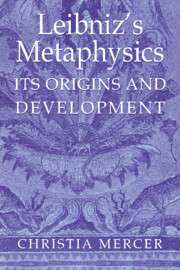Book contents
- Frontmatter
- Contents
- Acknowledgments
- References to Leibniz's works
- Introduction: first truths and half truths
- PART ONE METAPHYSICS OF METHOD
- PART TWO METAPHYSICS OF SUBSTANCE
- PART THREE METAPHYSICS OF DIVINITY
- PART FOUR METAPHYSICS
- 7 Matter, passivity, and panorganic vitalism, 1670–71
- 8 Phenomenalism and Preestablished Harmony, 1671
- 9 Preestablished Harmony, late 1671–early 1672
- 10 Final steps toward the mature philosophy, 1672–79
- Conclusion: the truth behind the First truths
- Appendix I (Not exactly) First truths
- Appendix II Leibniz's original assumptions
- Bibliography
- Index Locorum
- Index
Conclusion: the truth behind the First truths
from PART FOUR - METAPHYSICS
Published online by Cambridge University Press: 12 March 2010
- Frontmatter
- Contents
- Acknowledgments
- References to Leibniz's works
- Introduction: first truths and half truths
- PART ONE METAPHYSICS OF METHOD
- PART TWO METAPHYSICS OF SUBSTANCE
- PART THREE METAPHYSICS OF DIVINITY
- PART FOUR METAPHYSICS
- 7 Matter, passivity, and panorganic vitalism, 1670–71
- 8 Phenomenalism and Preestablished Harmony, 1671
- 9 Preestablished Harmony, late 1671–early 1672
- 10 Final steps toward the mature philosophy, 1672–79
- Conclusion: the truth behind the First truths
- Appendix I (Not exactly) First truths
- Appendix II Leibniz's original assumptions
- Bibliography
- Index Locorum
- Index
Summary
This book offers the first systematic study of Leibniz's intellectual odyssey from his student days in Leipzig to the development of one of western philosophy's great metaphysical systems. We have discovered much in the early works that is enlightening and surprising. In my Introduction, I claimed that one of the results of this historical and philosophical narrative would be a greater understanding of Leibniz's mature philosophy. I promised that the developmental story offered here would help us grasp the truths behind the First truths. As I see it, I have fulfilled that promise. Because the fundamental truths that underlie the mature thought just are the Aristotelian and Platonist assumptions articulated in chapters 2 through 6 and because Leibniz's mature metaphysics fundamentally is the core metaphysics presented in chapters 7 through 10, the analysis of the previous chapters turns out to be an examination of the central doctrines of the mature philosophy.
Let me be perfectly clear. I am claiming that the Metaphysics of Method, the Metaphysics of Substance, and the Metaphysics of Divinity constitute the background assumptions and implicit premises of Leibniz's mature writings and, moreover, that the various tenets that constitute the core metaphysics are interwoven throughout the fabric of Leibniz's mature thought. I said in the Introduction that because the mature Leibniz is rarely explicit about his underlying beliefs, we would have to turn to the early texts in which his basic views are closer to the surface and easier to discern.
- Type
- Chapter
- Information
- Leibniz's MetaphysicsIts Origins and Development, pp. 462 - 472Publisher: Cambridge University PressPrint publication year: 2001



